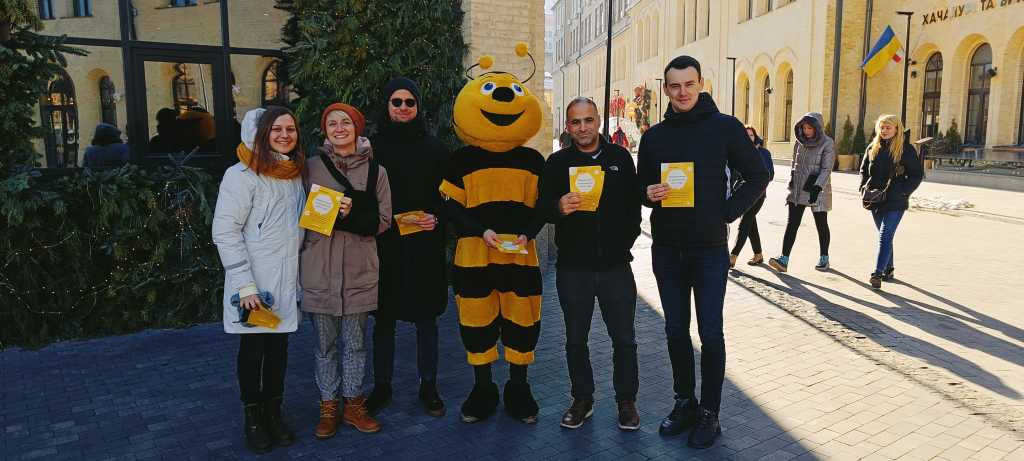Earlier this year as Russian troops massed along the Ukrainian border, Israel-headquartered Beewise offered to relocate each of its Ukraine-based technologists and up to 10 of their family members with all expenses paid for six months.
Diana Lisovenko, a software engineer from Ukraine’s capital city of Kyiv, decided to stay put. She thought the chances of war were slim.
“I thought there was a 5% possibility,” she said. “Who would have thought in the 21st century such a thing would happen?”
Speaking in mid-March via Zoom, Lisovenko said she spends her mornings as a volunteer ferrying food to the city’s remaining residents and to the soldiers defending them, driving in a car she rented in late February just as Russia started its attack on her country.
“In the morning, it’s much more safe to drive the car,” Lisovenko said, adding that she and her dog are staying in a friend’s Kyiv apartment.
Yet despite the war, her new volunteer work, the warning sirens, the explosions, and her company’s continuing offer to relocate her, Lisovenko, 30, said she is staying in her city and continuing to work.
She said she tries to log in after noon, explaining that she finds comfort connecting with her colleagues and having some normalcy to her day. She said she welcomes the ability to still work, saying that the emotional support and check-ins from her colleagues have helped keep her going.
Many non-Ukrainian companies – including US-based organizations — have workers in Ukraine, with a significant portion of those companies employing Ukrainian technologists. Research firm Gartner estimates there are more than 1 million IT professionals in Russia, Ukraine, and Belarus all together. It noted in its February 2022 “Impact of Russian Invasion of Ukraine on Software Engineering Services” report that most large- and mid-tier system integrators have some presence in those three countries. Gartner also said many software product companies have development centers in the region. Given the region’s importance to IT outsourcing, the Ukrainian crisis has also put the global IT market on edge.
CIO.com spoke to Lisovenko and three other Ukrainian technologists who have remained in their home country to learn about their experiences as they live and work during the war. Their stories show their resolve and commitment to look forward despite the destruction and uncertainty being inflicted on their land.
Work as a welcome distraction from daily threats
“We are still here; we are fighting. We are fighting for democracy,” said Valerii Sukhov, an engineering team lead with Beewise, which makes an autonomous beehive with an integrated robotic beekeeper.
Sukhov, 30, who has worked at Beewise for two years, said he, too, didn’t think war was probable.

Beewise Ukrainian team members, including Diana Lisovenko, software engineer (second from left), and Valerii Sukhov, engineering team lead (right)
Beewise
“I made some conclusions that something might happen,” he said. “But it’s pretty hard to understand how your neighbors who claimed they were your brothers and sisters could attack you in the morning without any good reason.”
Sukhov had been living in Kyiv but he moved with his wife and their 3-year-old child to western Ukraine; they’re staying in a friend’s family’s house near the city of Ternopil along with a half-dozen others.
Like others, Sukhov said he scrambled to get food and cash from the bank just before and as the Russian invasion started, but he hasn’t encountered as many challenges in getting the basics now. He said he and his family are safe. They’re not near the front lines, although they’ve been hearing the warning sirens sounding.
Sukhov said he appreciates his company’s relocation offers, although he himself cannot legally leave, citing government orders that require men ages 18 to 60 to stay in Ukraine. “That’s the right thing in this particular situation,” he said.
Companies have been stepping up in a number of ways to support Ukrainian workers, but Sukhov said it’s hard for them to do much to change the situation on the ground. “From my perspective there is not a lot of things that companies can do for us. But the support is good,” he said.
He added: “Ukrainians are very thankful to the countries that want to help us in anyway.’
Despite the sudden, dramatic changes in Ukraine and in his personal circumstances, Sukhov said he continues to work, calling it a welcome distraction.
“Work is the thing that can help you get outside your situation. You’re moving your focus from the news of what’s happening in the country,” he said.
Sukhov, who also connected via videoconference in mid-March, said his area’s telecommunication connections remain strong and reliable, so he’s able to connect with his colleagues in Ukraine, Israel, and other locales.
Enduring through turmoil
Although Sukhov and others welcomed the semblance of normalcy that work provides, each acknowledged the weight of the uncertainty facing him or her.
“The future is on the shoulders of the politicians and the army now,” Sukhov said. “We’re just waiting and hoping.”
Timofii Vlasov, a QA automation engineer with Totango, maker of a customer success platform, said he, too, finds work helps distract him from somber realities and his constant heightened state of alert.
“The first few days you’re just in suspense. It was alarming. But you can’t keep yourself all the time in that state. You need some kind of distraction from all this stuff going on around Ukraine, so work is a good solution,” he said, explaining that when colleagues are engaging him at work “you forget about all that’s happening around you at least for a moment.”
That, though, belies the difficulties of the new conditions in which he and others now exist.
Vlasov, 33, who has worked for Totango for the past four years, left Kyiv when the war started and relocated to the Odessa area to stay with his brother and his sister-in-law. He said he contends with poor internet connections. He must plan extra time to tackle typical activities, such as getting groceries as there are often long lines at the stores. He volunteered to help the local defense and has donated money to support Ukrainian defense and civilian needs. He also has to shelter multiple times daily (often at night) when warnings sound, noting that he often seeks refuge in the basement of his building. He acknowledged that it’s not bomb-proof, adding that many Ukrainians are not able to constantly move to more secure locations.
“You start to rely on the numbers that it’s not going to happen to you,” Vlasov said, adding that his main focus now is on the lives of his family members and their safety. “You’re just trying to do things that will help your family and things that will help your country.”
Vlasov is one of 15 Ukrainian workers that Totango employs, said Amit Bluman, senior vice president of engineering at Totango.
Bluman said Totango had developed an emergency plan in the weeks before the Russian invasion, although Bluman said, “we never thought we’d have to use it.”
Totango, like many other companies, has offered to relocate workers outside Ukraine and has extended other offers of support. Bluman said only one person relocated to another country, while the rest of the team is staying in their homeland.
The company continues to help however it can, such as helping find safe housing within Ukraine for one worker and his family, Bluman said. He noted that the company doesn’t obligate or expect its Ukrainian staff to be working right now.

Artem Horovoi, full stack engineer, Totango
Totango
“We want them to feel safe and to take care of their families,” he said. “[We’re] supporting them, that’s the most important thing we are able to do for our team.”
Artem Horovoi, 23, a full stack engineer with Totango, said he calls his family and friends in the morning and then goes to work. Like his colleague Vlasov, Horovoi has been contributing to local civilian and defense efforts. He said he is in a safe spot with reliable telecommunications, saying he, too, is keeping up with work.
But he acknowledged that more pressing issues often fill his mind.
“I think about my family,” he said, “and I just think about how I want all this to end and how I want all this to end very fast.”
Read More from This Article: Working from a war zone: Ukrainian IT pros share their experiences
Source: News

